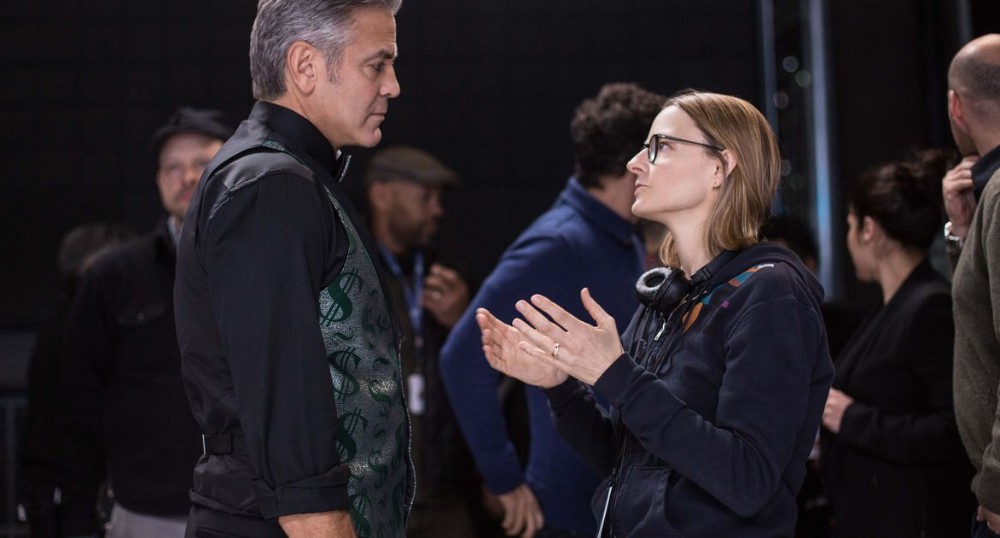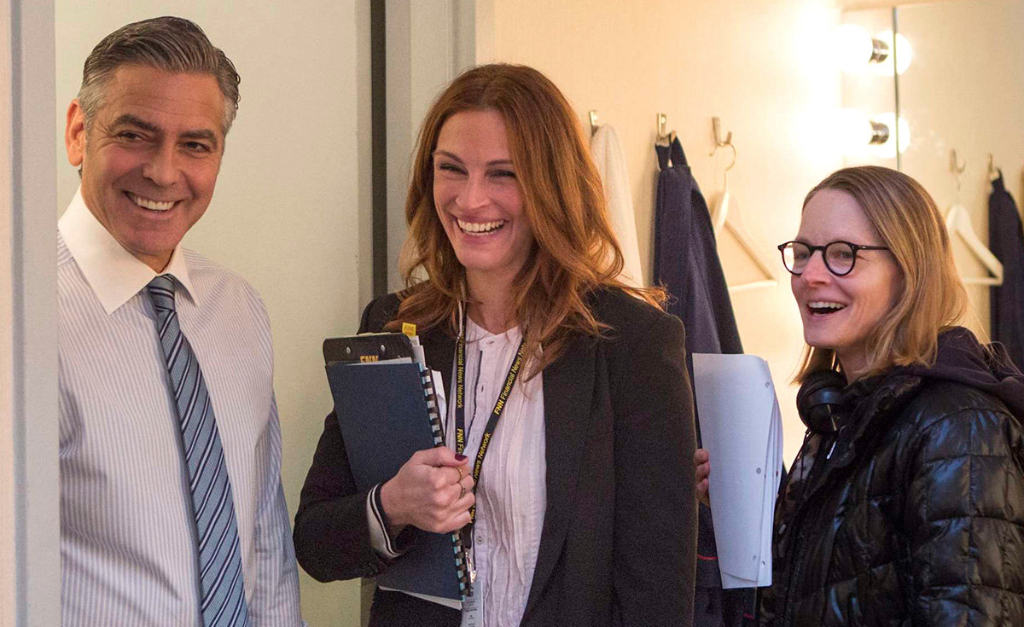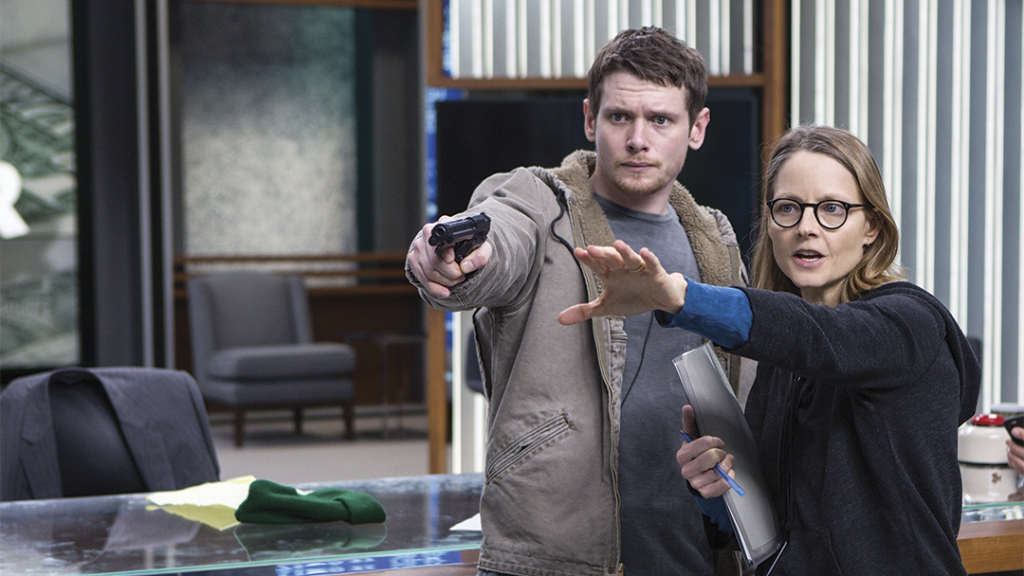Jodie Foster and George Clooney talk Money Monster: “It’s a fast-paced thriller but it’s like a real story”

In the real-time, high stakes thriller Money Monster, George Clooney and Julia Roberts star as financial TV host Lee Gates and his producer Patty, who are put in an extreme situation when an irate investor who has lost everything (Jack O’Connell) forcefully takes over their studio. During a tense standoff broadcast to millions on live TV, Lee and Patty must work furiously against the clock to unravel the mystery behind a conspiracy at the heart of today’s fast-paced, high-tech global markets. Here’s a chat with director Jodie Foster.
“I love this movie because it has two things that sometimes people think are opposites,” says Jodie Foster, who directs the thriller Money Monster. “One is that it’s a mainstream thriller that’s exciting, fast-paced, smart, and yet, still has a real accessibility. The flip side, which is the most important reason to go to the movies, is that you’re moved by a real story. It’s incredibly relevant.”
“To me, the most exciting part of the story, in addition to the cops, helicopters, guns, bombs, and fast-paced excitement,” Foster continues, “is how this man, Lee Gates, played by George Clooney, starts off one way – a shallow, smug, empty guy, who’s successful at his work but a failure in everyone’s eyes, including his own – but has a terrible moment that forces him, with Julia’s help, to rise to the occasion, find his humanity, grow up, evolve, and change.”
“The world of money has gotten out of control. When things go wrong, you don’t actually understand what it is that went wrong – and the regular guy gets screwed,” says George Clooney, who stars as the host of a financial news program who comes face-to-face with one of those regular guys who’s determined to hold someone accountable, by any means necessary.
“Jodie never lets up on the pressure cooker,” says producer Daniel Dubiecki, who produces the film with his partner, Lara Alameddine, and with Clooney and his partner, Grant Heslov. “This whole film takes place in real time as this event is broadcast on live television – it’s very tense.”
Clooney stars as Lee Gates, a celebrated stock picker and famed host of the titular financial television show, who darts and dances around his set, shouting investment advice and punctuating market talk with silly props and sound effects. “‘Money Monster,’ the show, is pretty ridiculous,” says Foster. “It’s a financial news show, but there’s lots of props, old movie clips, bells, whistles, and whoopee cushions that Lee
“Gates has come up with in order to explain the financial market. He sings and dances with beautiful girls, wears different hats – all so he can dispense stock trading tips – but it has left him with a buried sense of self-loathing. The film presents him with an impossibly unexpected chance at redemption.”
Re-teaming with George Clooney is Julia Roberts, who plays Patty Fenn, the unflappable, steadfast and longtime producer of Money Monster. “Patty Fenn is the uber-producer. She can multi-task like nobody’s business – she is amazing,” says Foster. “She controls the strings of this show and speaks in Lee Gates’ ear to tell him what his next move is. Lee Gates can be lazy. He doesn’t learn his lines. He says whatever the heck he wants to say, and she’s there to make sure that the show runs smoothly. She knows how to handle this loose cannon.”
Clooney adds that all of that showmanship is hiding a deep-seated contempt for the show’s own audience. “There’s a cynicism that reeks through these shows,” says Clooney. “You watch these guys behind their desks, telling you where to put your money – and when you do and you lose it, they go, ‘Well, that’s what happens.’”
However, Clooney notes: “The film deals much more with the three characters and what they’re going through – particularly the man that Jack O’Connell is playing.”
When one of Gates’ heavily hyped stock predictions, Ibis Clear Capital, mysteriously plummets, his blatant complacency is placed front and center for the world to see as Kyle Budwell (O’Connell), a distraught investor, hijacks a live “Money Monster” broadcast to hold Gates’ and Fenn’s feet to the fire.
In taking over Gates’ show, he sets in motion a crisis that unfolds in real time, on live television. “That was fun for us,” says producer Grant Heslov. “We’ve become almost numb to the stuff we see on TV and the internet, and by having this take place on live TV was a fun way to comment on that.
“Gates begins to talk to Kyle – at first, to simply try to prolong his own life, aided by Patty, who remains a calming presence in the control room. “Kyle doesn’t know that Lee is talking to Patty through his earpiece the whole time,” explains Heslov. “From a dramatic standpoint, it’s a great device, and I think it was fun for George and Julia to play as actors.”
Later, as Gates and Patty try to work out what’s happened, they become genuinely moved by Kyle’s pain; they rediscover some journalistic drive and bust open a Wall Street conspiracy that goes well beyond these three people.
“What was really refreshing was to do a story that was set in Wall Street, but wasn’t about all of that,” says Alameddine. “It was about three people coming together from opposite sides of the coin. This bombastic, superficial personality, by the end, finds a true connection to somebody that he never thought he would.”
To inhabit the character of Lee Gates, Clooney created the irreverent, madcap and larger-than-life reality television show personality. “Lee Gates is a bit of a showman,” says Foster. “It was George’s idea that Lee Gates should open the ‘Money Monster’ show with a dance. When he first came to rehearsals, he said, ‘I’m just going to need a half an hour to figure out the dance thing.’ And I replied, ‘I think you’re going to need a little bit more.’ So, we had the choreographer there and he got into it.”
Heslov says that sometimes being a producer is hard work. And then there are times that your producing partner shows up to dance. “It’s just fun to watch, you know?” he says. “It was one of those times that you get to sit back and relax and watch a performance. To watch him do that ridiculous dance for a couple of days – especially for me, because I’ve known him so long, and my kids were there, too – we really enjoyed that.”
“George really got into making a complete and total ass out of himself,” continues Foster. “I do love that about him. There’s something about the absurdity of seeing this middle-aged white guy walk on and do this like crazy hip-hop dance…You can’t help but laugh, and think his character is a buffoon.”
The idea that the entire crisis unfolds on live television was another intriguing aspect for Clooney. “I grew up in live TV – every day of my life for my first 16 years was live TV, because my father had a live variety show and did the news live,” says Clooney. “Later, I sort of forced NBC to do a live episode of ‘ER,’ and I did ‘Fail Safe’ as a live production. This was before other shows started to do really risky television; I thought the only thing that TV could do that films couldn’t was live. It’s flying without a net; that’s exciting.”
“I had worked with George on Up in the Air, and there’s a similar aspect to his character in that movie and this one,” says Dubiecki. “Both characters could have been unlikeable, one because he’s flying around the world firing people, the other because he’s become so cynical about the stocks he’s hawking on his show. But the incredible thing about George as an actor is the brilliant way he embodies these characters and makes them likeable. As the character changes, he takes the audience with him.”
Roberts re-teams with George Clooney as Gates’ producer/director, Patty Fenn. Roberts describes Fenn’s relationship with Gates as one of love/hate. “He’s her wild card, and she is just trying to keep the chaos controlled. She never knows what he’s going to do,” explains Roberts. “There are aspects of their relationship where they’re a good working team, and then parts of it where, she’s just gotten fed up, and would prefer to work in a place that makes one hundred percent sense to her. At the same time, she finds an enormous amount of joy because they’re opposites, and whenever you find your polar opposite, it’s intriguing.”
The real-life friendship between Roberts and Clooney contributed to the on-screen chemistry between Fenn and Gates. “George Clooney and Julia Roberts know each other, and care for one another, and have this instant, interesting chemistry that I didn’t have to do anything for. It just exists,” explains Foster. “The two of them felt incredibly close to each other. They have this intensity, this connection and this communication that’s from this organic intimacy between friends.”
“George and I are good friends, and we understand each other really well,” adds Roberts. “We’ve found the perfect balance of me being here to support him, and to create our scenes together, and to understand the vibe and the pace, and how we want to create these people together.”
Roberts was intrigued by the real-time, ticking-clock nature of the scenario. “Certainly, any time, as an actor, you have a ticking clock, that is a great advantage to know that there isn’t any time to waste,” she says. “It’s about problem-solving and being clever because nobody saw this situation coming.”
Taking the role of Kyle Budwell, the ordinary man turned to desperate measures following a big-bank fiasco that costs him his entire life savings, is Jack O’Connell. The breakout star of Unbroken, O’Connell portrays Kyle as a good, decent, hard-working young man who cracks under the pressure of financial ruin. “Kyle is a working class guy who believed that if he did the right thing and worked hard, that somehow he’d be able to have something in his life,” explains Foster. “He inherits some money, and tries to invest it as intelligently as possible, but ends up losing it all at the hands of something out of his control. The only thing he has in the world suddenly disappears into thin air, and he doesn’t know how it happened. Kyle can’t accept that. He can’t accept that he did everything right, and yet, he’s supposed to just walk away. Kyle refuses to accept failure and move on – instead, he chooses to fight back.”
“I empathise with him,” says O’Connell. “I think his unfortunate situation is quite relevant and something people can relate to. Still, no one would sympathise with the actions Kyle takes.”
Desperate, and turning to violence to levy responsibility for his injustice, Kyle sets his sights on Lee Gates and Walt Camby, the CEO of Ibis Clear Capital. “Kyle goes to the Money Monster set thinking that he’s going to see the two biggest culprits of his demise: Walt Camby, played by Dominic West, who is the CEO of the trading fund, and Lee Gates, who told his viewers with much fanfare to invest in Ibis Clear Capital,” explains Foster. “He feels like they’re in cahoots and he’s going to hold them accountable.”
“Kyle continues to ask the hard questions that nobody’s asking,” says Foster. “He refuses to turn a blind eye away from what happened. He knows that he’s not going to get his money back, but he will get answers by any means necessary.”
O’Connell sees his character as a victim of a financial system lacking the appropriate safeguards to protect the market from manipulations and malfunctions. “It would be easy to write Kyle off as a villain. It is extreme to threaten lives, but I feel he was pushed past the breaking point,” explains O’Connell. “What Kyle has done is out of desperation, and my hope in portraying him is that will come to understand what drives him to the breaking point – though he’ll pay the ultimate price for his actions.”
In the course of the film, Kyle becomes the catalyst for Gates’ own change. “True to form, Gates’ first response to this threatening situation is to try to manipulate Kyle,” explains Foster. “When he realises that all of his old ruses and all of his old scripts of manipulations are not going to work, he is forced to face the harsh fact that he’s been unconscious, asleep at the wheel, and that he can no longer afford to be complacent while lies are being told.”
To fully embody Budwell, O’Connell needed to tap into his own raw, visceral emotion. “Kyle is all heart. He makes rash, emotional decisions,” explains Foster. “Kyle is, at times, unstable and hard to take. But, there are other moments where he’s just a little boy, and you want to put your arms around him, and tell him it’s going to be okay. And Jack had to create Kyle based on a range of fluctuating feelings.”
“Jack just grabs you and he doesn’t let go,” says Alameddine. “He’s that great blend of strength and softness. Even though he’s doing something very unlikeable, he’s doing it because he wanted to be heard. Jack makes you want to feel something for him, to connect to his message in some way.”
Foster found O’Connell’s dedication to his craft truly admirable. “Jack is just such a wonderful gift of an actor,” says Foster. “I wish I approached acting that way when I was young with such incredible commitment and passion. I just love that about him – He’s able to just give so much. He just never stops giving.”
As Chief Communications Officer of Ibis Clear Capital, Diane Lester, played by Outlander’s Caitriona Balfe, is the spokesperson for the company embroiled in an unprecedented financial crisis. “Diane’s very interesting. She’s quite an ambitious person, and her job is very important to her, but she has a lot of integrity,” says Balfe. “There’s a sense of naïveté to her, which I quite liked. She believes in the company that she works for, and feels that they’re doing a lot of good. She has no reason to question what she’s being told. But once she begins to grasp the full picture of the consequences of her job, and how it affects other people, she very quickly becomes a truth-seeker.”
The cast is rounded out by Breaking Bad’s Giancarlo Esposito, who takes the role of Marcus Powell, the police captain trying to defuse the situation, and The Wire’s Dominic West as Walt Camby, the CEO of Ibis Clear Capital, the company whose sudden stock plunge has incited Kyle to action
The editorial unit
Photos: Courtesy of Sony Pictures/Atsushi Nishijima



























Facebook
Twitter
Instagram
YouTube
RSS